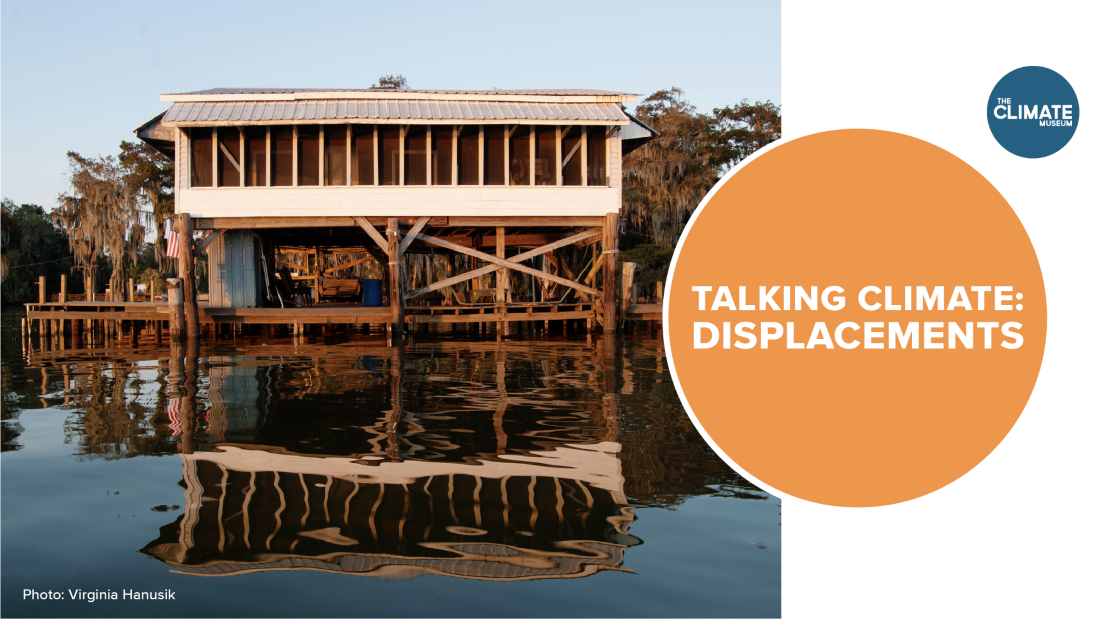A Cultural Institution Taking Action on Climate and Inequality: The Climate Museum in New York City
Talking Climate: Displacements laid the foundation for an argument about climate and inequality that the Climate Museum makes through the series: that one cannot understand the severity of the risks of the climate crisis or the far reach of its impacts into already-vulnerable communities without also understanding the way inequalities of multiple kinds produce and maintain those vulnerabilities. The series makes a case for how history shapes and situates what we see in the present. These can be histories that are hundreds of years old, and histories that are more recent, all of which point to the human production of crisis and the unfair distribution of crisis effects. And just as the scale of the devastation of both climate and inequality are enormous, so too are the stakes of rewriting those past scripts and righting the dispossessions through concerted action. Massie concluded the Displacements event with such a call to action: to make it a habit to call your congressional representatives if you live in the United States, emphasizing that “We need a whole new civic culture of truth, compassion, and reconciliation in recognizing the dynamics that our amazing speakers have been talking about today.” (Massie 2021) (*23)
(*23)
Creating a new civic culture, and a deepened civic engagement among its constituents, is certainly in accordance with the Climate Museum’s mission. The Talking Climate series furthers the goal of activating pathways for participants to engage in the democratic process and reimagine themselves as civic actors capable of effecting change as part of a political praxis. To return to Cameron et al.’s (2013) principles via McGhie (2018): even in this single example, we can see the Talking Climate series showcasing how the Climate Museum takes a stance on climate and inequality, how the Museum utilizes the storytelling and testimony of panelists to create a conversation about climate and inequality that an audience can access from multiple entry points, and how the Museum creates space for interdisciplinary dialogue as a central tenet of the series.
Since Displacements, the themes at the intersection of climate and inequality that have been featured as part of the Talking Climate conversation series include Grief, Infrastructure, Identity, Food, Law, and Health, with more series episodes forthcoming. Taken as a whole, the series makes a case for the numerous arenas in which the climate crisis must be centered as a site of action, and conversely, the necessity of climate-forward policy to robustly account for multiple injustices stemming from multiple inequalities when bringing a just climate future into being. During Talking Climate: Food,*6 *(6) Arcenio López, Executive Director of the Mixteco-Indígena Community Organizing Project (MICOP) in Southern California and a former farmworker, discussed the various crises that farmworkers navigate daily. On one hand, there is increased danger from heat exposure due to soaring temperatures as well as accumulated chemical exposure from pesticides. On the other hand, according to López, there is the fact that the agricultural system in California and elsewhere in the United States is rooted in racism and the disempowerment of farmworkers, many of whom are undocumented Indigenous immigrants. (López 2021) (*24) “The pandemic right now, the situation, it’s just a moment to unpack all of these inequalities that have been here, not just for the last 20 years, but the last 100 years … the climate situation, justice, is connected with health … and having legal documents to work.”(Ibid.)
(*24) “The pandemic right now, the situation, it’s just a moment to unpack all of these inequalities that have been here, not just for the last 20 years, but the last 100 years … the climate situation, justice, is connected with health … and having legal documents to work.”(Ibid.) (*24) He says that the organizing and advocacy work at MICOP doesn’t entail coming in and telling farmworkers what to do, but instead focuses on what farmworkers say their needs are, and building modes of action that center those needs.(Ibid.)
(*24) He says that the organizing and advocacy work at MICOP doesn’t entail coming in and telling farmworkers what to do, but instead focuses on what farmworkers say their needs are, and building modes of action that center those needs.(Ibid.) (*24)
(*24)
Dilshanie Perera ( 2021): A Cultural Institution Taking Action on Climate and Inequality: The Climate Museum in New York City. In: p/art/icipate – Kultur aktiv gestalten # 12 , https://www.p-art-icipate.net/a-cultural-institution-taking-action-on-climate-and-inequality-the-climate-museum-in-new-york-city/



 Artikel drucken
Artikel drucken